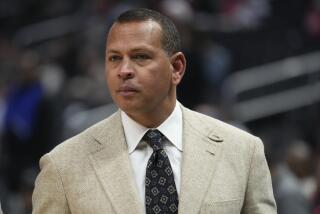TEXT OF PATRIOTS’ STATEMENT ON VOLUNTARY DRUG TESTING
- Share via
Here, in part, is the text of a statement Thursday by the New England Patriots’ psychiatrist, Dr. Armond Nicholi, concerning the NFL team’s voluntary drug-testing program.
On January 28, 1986, the Boston Globe declared, with front-page headlines, that the New England Patriots had “a drug problem”--specifically “the use of cocaine”--with a dozen players involved.” The next day, the Globe released the names of six players, stating “a major drug-abuse problem existed.” As team physician in charge of the drug-testing and drug-rehabilitation program for the New England Patriots, and the only person in the organization to receive the test results, I have a responsibility to set the record as straight as humanly possible.
1. During the past year we tested seven New England Patriots players who admitted to having some experience with recreational drugs.
2. The results of our testing showed that two players tested positively for cocaine and marijuana, and five players tested positively for marijuana.
3. Two of the five players who tested positively for marijuana stated that they had taken the drug only once during the year and were not even occasional users of the drugs. The results of their tests confirmed this.
4. Each player tested volunteered to enter our rehabilitation program that involved regular urine testing and individual private consultation with me, the team psychiatrist.
5. Our testing indicated that all seven players had been drug free for several weeks, with some drug free for the entire season.
6. Depending on the individual case, we tested as frequently as three times a week. Testing continued up through the week of the Super Bowl. Our tests indicate that each individual tested as absolutely free of any drug during the game in the Super Bowl.
7. Our testing program has been highly successful, highly sophisticated--with use of the most reliable tests--and highly sensitive to the needs of the individuals involved. The success of our program rests heavily on trust and strict confidentiality. We must therefore make unmistakably clear that neither the coach, nor the general manager nor myself released the names of the individuals mentioned in the Globe. The highest authority at the Globe will confirm the truth of this statement. The Globe will also confirm that we made every effort once we learned that they had names, to convince the editor of the sports section that public exposure of individuals would accomplish nothing positive. Our general manager, however, did not deny involvement of the names mentioned when asked--a passive acknowledgement he now regrets.
Our testing program as it existed this past year worked as follows:
When the coach received information that presented “reasonable cause” to suspect a player to be on drugs, he acted immediately by calling the player and asking him if the information was true. If true, he gave them the opportunity to enter our program to obtain help.
The coach never revealed to me or to others his sources of information. Each player confronted who admitted use of a drug agreed to enter the program. The program thus far has been 100% successful. We, of course, must follow up these players during the off-season to guard against relapse. The players who have been through our program have been the strongest proponents of having a voluntary testing program for the whole team.
More to Read
Go beyond the scoreboard
Get the latest on L.A.'s teams in the daily Sports Report newsletter.
You may occasionally receive promotional content from the Los Angeles Times.










